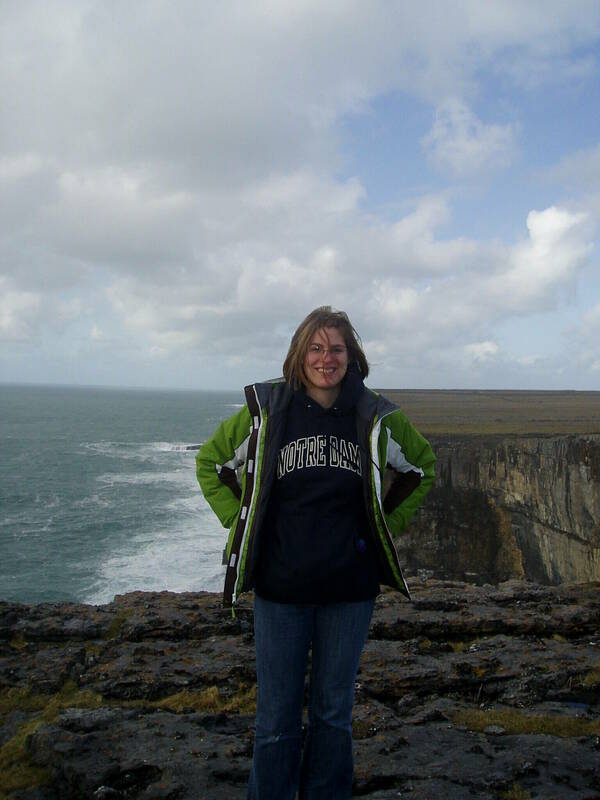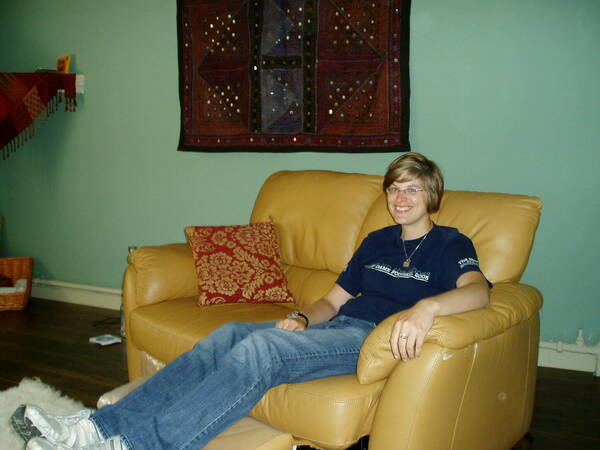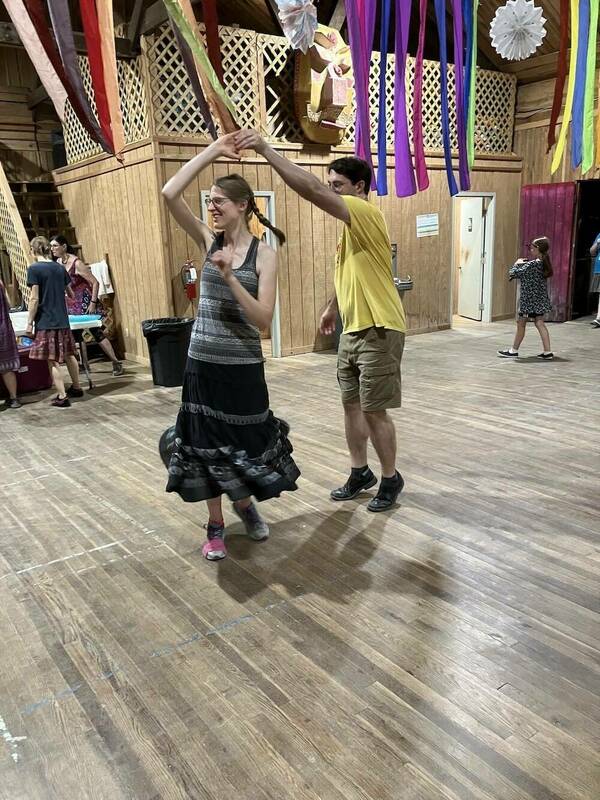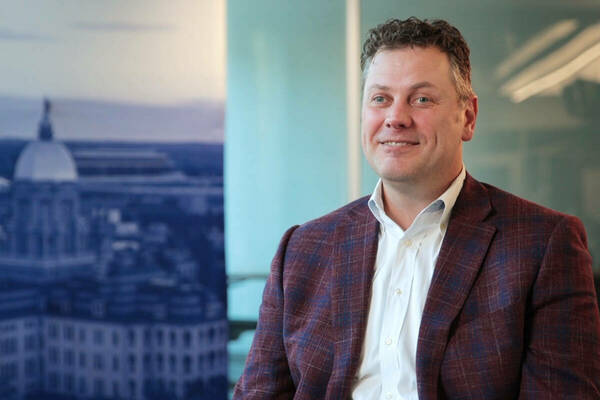
Greer Hannan ’09, ’14 MNA, ’15 M.Div. recalls a quote from St. Irenaeus that has guided her discernment since graduating from Notre Dame:
The glory of God is the human fully alive.
For Hannan, noticing when she has felt fully alive has been an important part of her post-grad journey. Now serving as the associate director of performance quality improvement and compliance at St. Vincent de Paul in Louisville, Kentucky, Hannan reflects on moments of “aliveness” that inspired her to serve those on the margins.
One of those first significant moments when Hannan felt “fully alive” was an uncanny one: breaking her arm while studying abroad in Dublin her junior year at Notre Dame.
The second week of classes, Hannan suffered a biking accident during an adventure that was “100 percent worth it.” After a magical weekend visiting a farmer in County Kerry, Hannan fell off a bike on her mountain journey back to the train station. Luckily her study abroad family was there for her — Kevin Whelan, Michael Smurfit Director of the Notre Dame Dublin Global Gateway, and his wife, Anne, took her to the emergency room and he sat in the waiting room with Hannan until three in the morning.

Despite the logistical and physical challenges, the injury forced Hannan to adapt new perspectives.
“It just put me in this place of vulnerability and frankly, neediness, that I hadn’t really been in before … and it forced me to to ask for help and accept help, and recognize my limitations and be carried by my community,” Hannan said.
Hannan started to pay more attention to the people she encountered on the streets of Dublin. Growing up in a suburban subdivision in Mishawaka, Indiana, she had not typically seen people who were houseless or experiencing poverty. Living in the heart of Dublin, however, and taking the public transit for regular visits to the hospital for check-ups, Hannan began to encounter folks she wouldn’t normally interact with on Trinity College’s campus.
“I felt especially vulnerable in these situations, but also felt a sense of companionship with the people I was encountering,” Hannan said.
Experiencing this physical vulnerability for the first time offered Hannan a tiny glimpse into the kind of challenges those she encountered in Dublin were experiencing. This came full circle for Hannan when, after a year in Dublin, she befriended a man named Danny who begged in one specific spot behind Trinity College. Hannan felt inspired by his storytelling and outlook on life, and particularly the kinds of questions he wrestled with about God and life — the same questions she asked as a philosophy major.
Hannan also was moved by how Danny brought out the best in her. A side of her character opened up that compelled her to consider how she could continue to interact with and serve others.
So when Hannan returned to South Bend, she started volunteering at the Center for the Homeless. Then, after graduating from Notre Dame, she moved back to Dublin to serve in a homeless shelter for those seeking recovery from alcohol and drug use.
When Hannan moved back that first year, her experience of Dublin was much more immersed in Irish culture than her student experience had been. As a full-time volunteer, she was now going specifically to places she was told as a student not to go. It proved to be another significant moment where Hannan felt herself becoming more fully human.
“I thrived on that because I wanted to expand my sense of what it means to be a human being, to make meaning and significance out of our lives … but it was also hard being a young adult with a lot of responsibility in an international context.”
Hannan’s tasks that year in Dublin were basic — locking up the building and letting folks back in, preparing beds for the next guests. She would also ride the bus with them, helping them navigate the city to get where they needed to go — even if she would make mistakes. In many ways, she says, her job was to greet them with kindness and bear witness to their daily activities — to see and recognize their full humanity.

“There were a million little moments like that, where people were willing to be vulnerable with me at such a dark time in their lives, and where people expressed a sense that I was a person that they could trust to be open in this way, or that they saw me as someone in the arena with them,” Hannan said.
After this year of frontline service work, Hannan returned to South Bend to work at Notre Dame at the de Nicola Center for Ethics and Culture. While there, she continued volunteering and serving folks in South Bend. At the Center for the Homeless, they tasked Hannan with grant writing on the side, which revealed to Hannan a different way she might serve. She saw a way that she could pair her strategic thinking and intellectual capacity to solve complex problems with a desire to serve others.
Hannan took the initiative to propose an academic track that might allow her to do exactly this, a track that no one at Notre Dame to her knowledge had attempted previously — combining the master of divinity (MDiv) and master in nonprofit administration (MNA) degrees. Hannan saw a distinct way in which she wanted to serve the world, and how these two programs complemented each other.
For one, Hannan recognized that those in pastoral roles don’t often receive formal training in financial literacy or accounting, and the MNA degree would offer her that key learning.
“I didn’t really know what kind of role I would have on the other side of this, or what to look for or apply initially. I kind of took a winding path,” Hannan said.
The nonlinear path proved to be successful. The day after graduation, Hannan hopped in the car and drove down to Louisville, Kentucky, where she’s been for the last eight years — first in a grant writing role at a local foster care organization, Father Maloney’s Boys and Girls Haven, and now at St. Vincent de Paul Louisville.
St. Vincent de Paul Louisville provides an entire campus of social services in the heart of Louisville, including a homeless shelter, transitional and permanent housing, a family success center, soup kitchen, food pantry, clothes closet — “a one-stop shop” to serve most needs. The nonprofit had been on Hannan’s radar during grad school and she had even cold-called St. Vincent in the spring of grad school, feeling like its rootedness in the Catholic Social Tradition resonated with her, but also seeing how expansive its operations were and ways they were using resources.
At the time, they didn’t have a position for Hannan. But sure enough, a year later, the executive director called Hannan with an opening to oversee the public funding of the organization. That role has since grown to include quality improvement and compliance functions. In her work, she gets to marry her problem-solving skills and philosophy-trained mind to impact those struggling with addiction and homelessness in Louisville.
Hannan thinks back to how studying abroad in Ireland “changed everything” for her — the immersive experience, her unexpected injury — and offers advice to Notre Dame students deciding what to pursue after graduation.
“It won’t be a straight line necessarily and that’s OK — you’ll develop new capacities, you’ll be challenged in new ways. … If you stay curious, that’s a good thing, if you grow beyond who you were at Notre Dame, that’s a really good thing. … The way I perceive myself now is not the way I perceived myself as an undergraduate, or even as a graduate student,” Hannan said.

Hannan continues to “be fully alive” outside of her professional role. She hosts a podcast “purely for joy in my free time,” Femammal, in which she “holds space for women to explore what it means to live well in our bodies,” opening up dialogue to discuss their bodies, life cycles, communities, and families. Hannan herself has experienced tough gynecological conditions, and how these topics become taboo.
“I’m working hard to break down those taboos, and invite other people to share their stories as openly as I’ve shared my story in hopes of bringing about more connection and less confusion. …This is just as important to me as the other work I do, and people should feel really good about who they are and what they do outside of work,” Hannan said.
Hannan also belongs to a group of contra dancers, which is an American form of folk dancing done to live music, with a caller instructing movement and a long line of partners. Dancers change partners each dance, and the group celebrates diversity in age, race, gender, etc.
“It really builds community across generations. … It teaches me how to be in my body instead of living in my head. That’s really important to me,” Hannan said.
The contradance line in some ways serves as a metaphor for Hannan’s life — hand in hand with strangers, celebrating being fully alive and forming connections with others.
Originally published by at weare.nd.edu, a digital publication from the Notre Dame Alumni Association telling stories of Domers doing good in the world.


